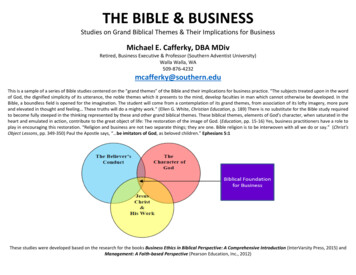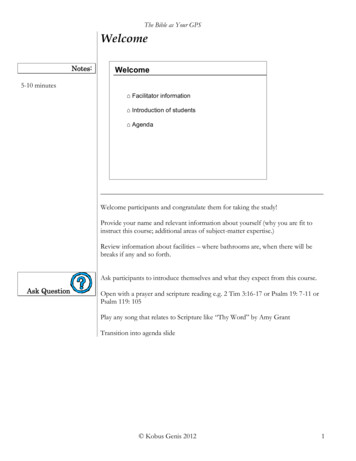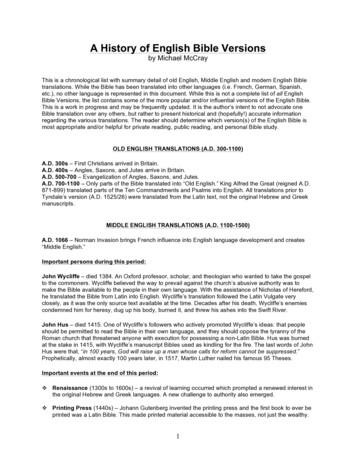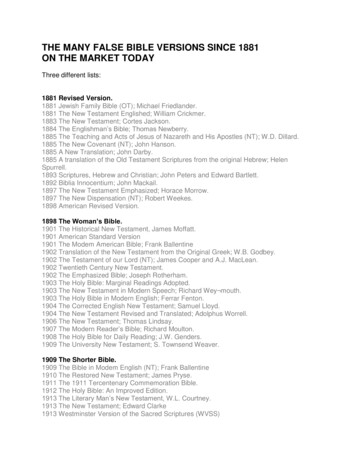
Transcription
THE BIBLE & BUSINESSStudies on Grand Biblical Themes & Their Implications for BusinessMichael E. Cafferky, DBA MDivRetired, Business Executive & Professor (Southern Adventist University)Walla Walla, WA509-876-4232mcafferky@southern.eduThis is a sample of a series of Bible studies centered on the “grand themes” of the Bible and their implications for business practice. “The subjects treated upon in the wordof God, the dignified simplicity of its utterance, the noble themes which it presents to the mind, develop faculties in man which cannot otherwise be developed. In theBible, a boundless field is opened for the imagination. The student will come from a contemplation of its grand themes, from association of its lofty imagery, more pureand elevated in thought and feeling These truths will do a mighty work.” (Ellen G. White, Christian Education, p. 189) There is no substitute for the Bible study requiredto become fully steeped in the thinking represented by these and other grand biblical themes. These biblical themes, elements of God’s character, when saturated in theheart and emulated in action, contribute to the great object of life: The restoration of the image of God. (Education, pp. 15-16) Yes, business practitioners have a role toplay in encouraging this restoration. “Religion and business are not two separate things; they are one. Bible religion is to be interwoven with all we do or say.” (Christ’sObject Lessons, pp. 349-350) Paul the Apostle says, “ be imitators of God, as beloved children.” Ephesians 5:1These studies were developed based on the research for the books Business Ethics in Biblical Perspective: A Comprehensive Introduction (InterVarsity Press, 2015) andManagement: A Faith-based Perspective (Pearson Education, Inc., 2012)
The Cosmic Conflict & BusinessBy Michael E. CafferkyIntroductionWhat are the guidelines for business that emerge from the Bible story about the cosmicconflict (a.k.a. great controversy)?Jesus Christ: The central figure When Jesus appeared, he made a striking, radical claim that his presence andhis work was bringing about the end of Satan the champion of wrong doing.(Matthew 28:18; John 12:31-32) The first leaders of the Christian movement interpreted the work of Jesus interms of a cosmic setting. (Acts 10:38) Jesus Christ’s mission is described explicitly in terms of the cosmic conflict: Togive abundant life while rendering powerless the one who championed deathand misery. (John 10:10; John 16:8-11; Colossians 1:15-20; Hebrews 2:14; 1John 3:8) Instead of using coercion, Jesus Christ chose to win hearts by demonstratingloyalty to the principles embedded in the character of God. (John 12:31-32) Jesus extended his own work by delegating authority to his first followers toconfront the powers of evil. (Matthew 10:1; Mark 3:14-15)How is God’s management style contrasted in the conflict? God promised to be actively involved in the struggle between right and wrong.(Genesis 3:15; Revelation 12:7) Two of the greatest leaders in ancient times described the chief characteristicsof God’s government. These include faithfulness, righteousness, justice andloyalty. (Exodus 34:6-7; Deuteronomy 32:4; Psalm 45:6; Psalm 89:14; Psalm97:2; Psalm 99:4; Psalm 145:17) John, the disciple closest to Jesus Christdescribed God’s governance the same way. (Revelation 16:7; Revelation 19:11) The chief opponent to God’s program of flourishing life uses coercion anddeception. (Revelation 13:14-17) The Bible story reveals the difference between God’s character and Satan’scharacter. (Exodus 34:6-7; Acts 13:10; 2 Corinthians 11:14; 1 Peter 5:8-9)How can we fulfill our role in this cosmic conflict? By being whole-hearted in our commitment to Christ. (2 Corinthians 11:3; 1John 3:10-14; Revelation 14:12) By participating! Paul, the entrepreneur, said that believers are on stage in thiscontest. (1 Corinthians 4:9; 1 Timothy 6:12) By imitating the “Manager of the Universe.” (Ephesians 5:1; 3 John 1:11) By serving others rather than coercing them, but also by setting boundaries.(Matthew 20:25-26) By developing core competencies in using the key resource that provides acompetitive advantage in this conflict. (2 Corinthians 10:4-5; Ephesians 6:1217; 1 Thessalonians 5:4-8) By being faithful to the principles of right doing in the marketplace. Paul, thetent maker, and James gave encouragement to be faithful to the ancientprinciples of right. (Ephesians 4:27; James 4:7) The context includes themarketplace.By choosing carefully when we should put our careers on the line to speak upfor right, come what may. (Proverbs 9:7-8; Amos 5:10) Not everyone is calledto be a prophetic voice in the marketplace every day, for every issue.What are the implications for business?Here are just a few examples: Prevent fraud, theft, cheating from destroying an organization by supportingthe use of generally accepted accounting principles. Encourage people inside and outside the organization to act with integrity andavoid wrong doing that could harm others. Promote freedom to choose, but set limits on freedom so as to preventanarchy; avoid using coercion and manipulation. Put limits on destructiveemployee behaviors. Prevent bullying, open expressions of anger or coercion. Use managerial control and feedback reporting systems as positive influenceson ethical behavior (openness, transparency). Set the atmosphere in the company that encourages positive welfare producingbehaviors of employees, customers and suppliers and that discouragesbehaviors that are destructive of the organization or the larger community. Foster a balance of power between those who are in higher authority and thosein lower authority. Think carefully regarding which issues for which you are willing to put yourcareer on the line.Points to Ponder On which side of the contest are you? What are you doing to champion right in the part of the marketplace where youwork? When was the last time you encouraged those around you to follow integrityand justice? Is it possible to win the battle between right and wrong in the marketplace allby yourself? How is God at work in your work as you fulfill your responsibilities in themarketplace?Consider this: The cosmic conflict described in the Bible reveals how God manages theuniverse when some stakeholders openly rebel against his plan for flourishing life. In ourwork in the marketplace, when we honor the Manager of the Universe and Hischaracter, when we advocate on behalf of the fundamental principles revealed in theconflict, when we integrate these management principles into our business, we aretelling about Jesus Christ just as surely as when we mention him by name.
Creation’s Message for Business Professionalsby Michael E. CafferkyIntroductionWhat are the guidelines for business that are either stated or implied in the famousCreation Story (Genesis 1-3)?Jesus Christ: The Original Entrepreneur- InvestorJesus Christ is the originator of the value chain which is integral to business activities.(Isaiah 44:24; John 1:3, 10; 1 Corinthians 8:6; Colossians 1:13-17; Hebrews 1:1-2;Revelation 4:11) Jesus Christ is the owner of all things. This ownership leads him to respect andcare for what he owns. (Yet, he has entrusted to us the use of his property as adistribution system for his blessings (Psalm 24:1; 104:24) Everything that humans do in commerce involves something that came directlyfrom the hand of Christ, the Creator. Our daily worship is directed toward the One who made everything themarketplace depends upon. (Revelation 14:7)When God created this earth, he took a risk allowing freedom of choice. His action tocreate this earth and establish day-to-day operations of flourishing life wereentrepreneurial. It involved creativity, innovation, division of labor, coordination of laborand supply chain management. It had a goal larger than economic well-being. The biggergoal was for flourishing life and happiness for all involved.What is the larger purpose that Jesus Christ has for us in our work in business? Creation is where we first see God coming to this earth to bless, to make aplace for flourishing life to give abundant life. Creation is the story that Godcame with the gift of life. God is a goal-oriented worker who followed a designto serve and bless others. He created us in his own image to participate in thiswork of blessing by acting on his behalf. (Genesis 1:26-28; Acts 17:24-26;Ephesians 2:10) Accordingly, business provides the setting in which humans canshare in the joy of providing flourishing life. Dominion over the earth (Genesis 1:26-28; Genesis 2:15; Psalm 8:3-6) involvesnot only mastery and control over nature to build the carrying capacity of theearth to support increased population, it involves a more fundamental purpose,namely to care for and bless others with flourishing life. It also involves caringfor the needs of the earth as a worker cares for the needs of his employer andthe employer’s organization. (Genesis 2:15) Our work is not independent from God. We work for him and with him. (1Corinthians 3:9; Colossians 3:23) The wise, power employed at creation is the same power at work as we arerecreated in us His image. Humans have a part to play in this recreation, too. (2Cor 3:18; 2 Cor 5:17; Eph 2:10; Col 3:10; 2 Pet 1:4)What are the implications for business from the Creation story (Genesis 1-3)? God created a variety of different elements in the earth that, collectively, aredesigned to support flourishing life. From an organizational point of view, wesee a high degree of specialization and a coordination of goal-oriented effortwhere humans share in the leadership for flourishing. A structural division in time was set aside for the purpose of rest (Genesis 2:13). We need time away from work, too. Creation shows the interdependence we have with each other and with theearth itself (Genesis 1-2). Fostering flourishing life means fosteringinterdependencies. Create mechanisms for workers to support each other intheir work; Remove barriers that limit interdependence (structural barriers inhow workers are organized – division of work, coordination of work; Establishparameters for sharing or accessing shared resources like inventory, commonlyshared equipment Moral authority is found in God, not humans. (Genesis 3) In business, act as acommunity agent for preserving and protecting God’s moral authority. Humans are given a wide latitude of freedom, but within boundaries. Freedomshould not lead to anarchy. There are consequences to our actions. Earth’s resources and the people on earth are not merely resources to beexploited. The earth is holy. (Leviticus 27:30) Be mindful that business is one setting for the restoration of the image of God. Invest time and resources to produce that which promotes flourishing life. Avoid making and selling products that harm living things. As risk of harmincreases for a particular product, work diligently to minimize these risks;educate stakeholders regarding the risks of harm; make improvements withcontinued learning about the risks; recall damaged products. Plan for a careerin an industry or business that supports long-term flourishing life or one thatcounteracts the forces which undermine flourishing. Respect the earth and all that it contains; minimize harm to the earth and itsresources; clean up after business activities. Improve the physical work spaces and working conditions of workers: Clean airand water, placement of materials, machines, work surfaces, posture(ergonomics), improve physical comfort in highly demanding tasks and providerest and recovery.Consider this: Creation reveals the character of God. In our work in the marketplace,when we honor creation and the elements of God’s character that it stands for, whenwe advocate on behalf of the fundamental principles revealed in the Creation story,when we integrate these principles into our own habits in business, we are telling aboutJesus Christ just as surely as when we mention him by name.How is God at work in your work as you fulfill your responsibilities in the marketplace?
Radical Commitment To God’s Plan & BusinessMichael E. CafferkyIntroductionWhat can we learn for business from the Bible idea of holiness?What does the idea of holiness mean in Scripture?The idea of holiness has many facets making it a deep, rich theme of Scripture: Human holiness is not on par with God’s holiness. We must humblyacknowledge that our holiness does not equal his. 1 Samuel 2:2; Revelation15:4 God’s holiness energizes him to come to us with redemption. His holiness is thereason we can rejoice in his faithfulness to his promises of redemption. Exodus15:13; 1 Chronicles 16:35; Psalm 33:21; 68:4-6; 105:3; Isaiah 25:9; 48:17; 54:5 God’s holiness separates him from us. Holiness involves a whole heartedcommitment to the process of separating ourselves from things and actionswhich undermine God’s plan for flourishing. 2 Chronicles 29:5; Psalm 24:3-4;Romans 11:16; 1 Corinthians 7:14; 2 Corinthians 7:1; Ephesians 5:27;Colossians 1:22; 3:12; 1 Peter 3:11; 2:21-22; 1 John 3:3 The call to holiness is part of God’s eternal plan for us. Ephesians 1:4 God’s call to us is, among other things, a call imitate his holiness in our actions.Leviticus 11:44-45; Leviticus 19:2; Leviticus 20:7; 2 Corinthians 7:1; Ephesians5:1-2; 1 Timothy 1:9; 1 Peter 1:15-16; 2:21-22; 2 Peter 3:11 Being consecrated or sacred means engaging in a radical commitment to be setapart for service as a co-worker with God in the fulfillment of God’s promises.Exodus 29:37; 30:29; Leviticus 10:3; 11:44-45; 20:26 Holiness is intertwined with faithfulness (truth) and righteousness. Psalm 15:15; Psalm 71:22; Isaiah 5:16 Holiness is not just individual but also something for social groups to emulate.Exodus 19:6; Deuteronomy 7:6; Deuteronomy 28:9; Romans 12:1; 1Corinthians 3:17; 1 Peter 2:9; 2 Peter 3:11What are the implications for business from the Bible theme of holiness? One of the portions of the Bible that is sometimes called the “Holiness Code” isfound in the book of Leviticus and supported in Deuteronomy. This book hasseveral things to say that are directly relevant to business. Treat everyone fairly and avoid improving your own financial position byhurting another party. Leviticus 19:13; Deuteronomy 24:14 Be generous with those who are at the margins of economic productivity. Pullthose at the margins into the core of productivity who have a difficult timegetting access to the marketplace. Leviticus 19:9-10; Deuteronomy 24:19 Have compassion. Do not take an injurious or insulting action toward otherpeople who cannot act to prevent the injury or the insult. Do not secretly harmothers for your own advantage who cannot defend themselves or make choicesbecause they lack key information. Leviticus 19:14, 32; Deuteronomy 27:18 Act with integrity. Be impartial in how you treat people regardless of theirsocial-economic position. Leviticus 19:15; Deuteronomy 16:18-20Protect the safety of another person including their reputation. Do not slander.Share the responsibility for being prudent by taking precautions to preventphysical injury to others. Leviticus 19:16; Deuteronomy 22:8Ecology and fairness: Develop natural resources sustainably. Don’t waste a keyresource for a something other than its designated purpose if doing so willprevent the community from enjoying its full, intended value. Leviticus 19:23;Deuteronomy 20:19-20Equality. Treat strangers as equals by not oppressing them or doing them harm.Do not exact a promise from someone who is known to have a difficult timerepaying. Leviticus 19:33-34; Deuteronomy 24:17Honesty in trade. Do not use unjust business systems to deceive. Leviticus19:35-36; Deuteronomy 25:13ffPoints to Ponder The commitment to emulate God’s holiness places on us a responsibility tomake changes in our moral actions in a social environment. The faithfulfollower will not be content to sit idly by when there is an opportunity toimprove moral action. Be faithful in paying what you promise to vendors. Don’t try to manipulatevendors with your words in order to avoid paying on time. Make the commitment never to engage in corrupt practices. Protect another person’s reputation by not slandering. At the same time, helpothers in the community avoid injury from persons who are destructive: Givewarnings. Don’t use what you know, that the other party does not know, to takeadvantage of other parties.Consider this: Holiness in all dimensions of life is a central element of the character ofGod. In our work in the marketplace, when we imitate God by staying far away fromactions that undermine God’s plan for flourishing life, when we advocate on behalf ofwholehearted commitment to principles that foster flourishing, when we integrateholiness thinking and action into our own habits in business, we are telling about JesusChrist just as surely as when we mention him by name.For examples of how holiness relates to business, contact Michael E. Cafferky.
Shalom & BusinessBy Michael E. CafferkyIntroductionWhat can we learn for business from the Bible idea of shalom (peace)?What is shalom?Shalom means flourishing, well-being and happiness in all dimensions of life: spiritualwell-being, physical health, social harmony, justice, international peace and economicwell-being. (Psalm 23; Psalm 72; Isaiah 1:17; Isaiah 59:8) God’s plan for humans is to experience all the blessings of shalom (peace) thathe had promised in the covenant. We have a role to play in experiencingshalom. (Numbers 6:24; Deuteronomy 4:1-8; 6:18, 24; Psalm 34:14; Zechariah8:16-19) The hope and promise of a full life of well-being is the essence of Shalom(Leviticus 25:18; Deuteronomy 4:1-8) God’s law is the prescription for a life of peace and prosperity (Leviticus 25:18;Deuteronomy 30:16; Psalm 78:10; Psalm 119:144, 165). The Bible contrasts shalom with misery. (Genesis 2:9; Genesis 41:30; Psalm37:27; Psalm 41:1; Isaiah 45:7; Jeremiah 29:11; Jeremiah 39:16) The economic dimension of shalom is the only one with constraints placedupon it. The constraint on economic well-being is brought up three times in theDecalogue. (Exodus 20:8-11; Exodus 20:15; Exodus 20:17) Jesus is the fulfillment of the promises of shalom. (John 10:10; Ephesians 2:14)What does the Bible say about prosperity? Ultimately, prosperity comes from God. (Deuteronomy 8:11-18; Proverbs10:22; Ecclesiastes 5:19) Prosperity is multidimensional. At the root is the idea of shalom. Prosperity is multigenerational. (Genesis 45:10; Deuteronomy 4:40; 6:4-7; 7:9;Psalm 128:6; Proverbs 13:22) Prosperity is communal and individual. The dominant emphasis is oncommunity prosperity.o Community emphasis: (Deuteronomy 4:40; 8:18; Jeremiah 29:4-7; Ezekiel37:26; Zechariah 1:17; Malachi 3:9-12)o Individual emphasis: (Leviticus 18:5; Joshua 1:7-8; 1 Samuel 18:14-15; 1Chronicles 4:10; Psalm 1:1-3; Psalm 23:1; 92:12) True prosperity is something we should pursue and pray for. (Psalm 122:6;Jeremiah 29:7) Some things more important than money include: Truth (Proverbs 23:23);reputation (Proverbs 22:1); wisdom. (Proverbs 3:14; Proverbs 8:11, 19; 16:16);knowledge. (Proverbs 8:10; Proverbs 20:15); diligence (Proverbs 12:27);covenant (Psalm 119:14, 72, 127, 162); The fear of the Lord (Proverbs 15:16);Righteousness (Psalm 37:16; 1 Timothy 6:11).What are the implications for business from shalom? Work to remove injustice / unfairness in the work place and market. Keep economic goals centered on a wide definition of “prosperity” in all itsdimensions for the wider community. When financial goal becomes super-important, manage the impact of this goalon the other goals of shalom.o Monitor the social relationships and contribute to the sense of communityand mutual benefit. Show that you are happy to see your workers,encourage storytelling, get deeper than small talk, give credit to othersoften, contribute to others feeling confident, challenge workers to pushthemselves, connect people together in work groups, informal groups andhonor workers’ desires to worship God.o Find ways to support each other in the work to lessen the toilsome burdenelements of work.o Find out what in your business causes the most misery for workers,customers and the larger community. Work together to reduce oreliminate this. Invest time and resources to make products that promote positive, flourishinglife or that counteract the effects of other products which detract fromflourishing life. Avoid making and selling products that harm living things. As risk of harmincreases for a particular product, work diligently to minimize these risks;educate stakeholders regarding the risks of harm; make improvements withcontinued learning about the risks; recall damaged products. Plan for a career in an industry or business that supports long-term flourishinglife or one that counteracts the forces of evil which undermine flourishing life. Respect the earth and all that it contains; Avoid pollution; clean up afterpolluting. Foster interdependence: Create mechanisms for workers to support each otherin their work; Remove barriers that limit interdependence (structural barriers inhow workers are organized – division of work, coordination of work). Improve the physical work spaces and working conditions of workers: Clean airand water, placement of materials, machines, work surfaces, posture(ergonomics), improve physical comfort in highly demanding tasks, and providerest and recovery.Consider this: Fostering abundant life in all dimensions is a central element of thecharacter of God. In our work in the marketplace, when we imitate God by upholdingprinciples that lead to well-being in all dimensions, when we advocate on behalf offlourishing life, when we integrate shalom thinking and action into our own habits inbusiness, we are telling about Jesus Christ just as surely as when we mention him byname.For more information on the biblical idea of prosperity, contact Michael E. Cafferky.
Loving Kindness & BusinessMichael E. Cafferky IntroductionWhat are the guidelines for business that come from the Bible concept of lovingkindness? The Bible Idea of Loving Kindness The core ideas of the term loving kindness (from the Hebrew language) includedeep, abiding loyalty and compassion. (Exodus 34:6; Psalm 33:5) The principles of covenant relationships that foster flourishing life are summedup in the idea of loyalty and compassion. (1 Corinthians 13:13; Galatians 5:14) God’s approach to management of the universe is founded on loyalty andcompassion. (Psalm 86:15; Psalm 89:14; Psalm 117:2) Loyalty is seen in action when promises are fulfilled and when we chose not totake vengeance. (Leviticus 19:18; Deuteronomy 7:9)Jesus Christ: The Reality and Greatness of God’s loyalty and compassion God’s loyalty to us is shown in action when he sent his only Son to be with us.(John 1:14; John 3:16; Romans 8:39; 1 John 4:8-10) The life, death and resurrection of Jesus Christ shows what is the greatest typeof loyalty. (John 15:13; Ephesians 5:2) The greatness of God’s love is embodied in Jesus Christ. (Romans 8:39)What instruction does the Bible have for us in terms of loyalty and compassion? Be responsible for other people’s assets. (Exodus 23:4-5; Deuteronomy 22:1)Loyalty is directed toward the larger community. Don’t take vengeance on others. (Leviticus 19:18; Matthew 22:39; Mark 12:3133; Luke 10:27; Romans 13:8-10; Galatians 5:14; James 2:8) Test your loyalty to God by this simple principle: How loyal are you to otherpeople? (1 John 3:10-14; 1 John 4:8) We imitate God’s great love in our social actions by being loyal. (Micah 6:8;Ephesians 5:2) Loyalty and compassion results in unity among believers. (Colossians 3:14) When it is in our power to do good, we should do it. (Proverbs 3:27)What are the implications of loyalty and compassion for business? Businesses can support interpersonal loyalty by how they structure deals withcustomers and how they go about attracting customers. Offering deals tocustomers that tempt them to undermine their relationship with their familyundermines loving kindness. Loyalty can be fostered in the employer-employee relationship, too. Companiesthat are loyal to workers even when the economy tanks, foster shalom in thecommunity. Unselfish and giving when someone is in need. Even to an enemy at work. Do not take vengeance on the people you work with, your customers or yoursuppliers.The purpose of business: to be one of the places in society where people fosterloyalty in relationships the community.Show employees compassion when they make mistakes. They are most likelyembarrassed and chagrined. Help them feel at ease. Show appreciation whenthey make commitments to improvement.Demonstrate loyalty to your subordinates by being faithful to them.o Take a turn helping during a difficult task or when trying to meet animportant deadline.o Work side-by-side with subordinates to demonstrate yourcommitment to the tasks and to your relationship with them asemployees.Be faithful to your spouse. Working relationships can become close andintense. You may spend more time with persons at work than you do with yourspouse and children. You may find yourself attracted to someone at work otherthan your spouse. Getting involved in a relationship with someone at workoften complicates the working relationships. It can cause problems at homeand at work. Take your spouse to work with you sometime and introducehim/her to people you work with including the persons at work that you feelsome attraction toward. This will help prevent unfaithfulness.When a supplier, customer or outside stakeholder complains about a fellowworker, be careful not to be unfaithful to your colleague by automatically sidingwith the outside stakeholder without checking into the “rest of the story.”When one employee comes to complain about one of your subordinates or aclose friend who works in another department, assume that there may beanother side to the story. Covenant relationships are important! Therelationship itself must be respected. You show disrespect to the relationshipwhen you automatically and uncritically take information that you have beengiven and assume that the information needs no further explanation orconsideration.Consider this: Loving kindness (loyalty, compassion) is a central element of the characterof God. In our work in the marketplace, when we imitate God by upholding deep,abiding loyalty, when we advocate on behalf of loyalty and compassion, when weintegrate biblical loyalty and compassion into our own habits in business, we are tellingabout Jesus Christ just as surely as when we mention him by name.For more information on how the theme of loving kindness relates to the grand biblicaltheme of covenant, contact Michael E. Cafferky.
Truth & BusinessBy Michael E. CafferkyIntroductionWhat are the guidelines for business that emerge from the Bible concept of truth?The Bible Idea of TruthThe Bible concept of truth has two main meanings: Truth is what is factual, genuine, real and believable as contrasted withfalsehood and lies. (Proverbs 12:17; Jeremiah 9:3-5; Matthew 22:16; John16:7; John 18:38; Romans 1:25; Ephesians 4:25) Truth is action-oriented faithfulness and reliability when tested by time andcircumstance. (Exodus 18:21; Exodus 34:6; Joshua 24:14; 1 Kings 2:4; Psalm25:5, 10; Psalm 51:6; Psalm 89:14; Proverbs 3:3; Proverbs 23:23; John 1:14)The ultimate welfare of the earth depends upon the faithfulness of the Creator andRedeemer. In the Bible the idea of faithfulness is often referred to by using the Englishword “truth.”Jesus Christ: The Reality of God’s Faithfulness A top-level leader in the Bible story described God as being loyal (lovingkindness) and faithful. (Psalm 86:15) God’s way of managing the Universe, his character shown in action, a famousking described as faithfulness. (Psalm 89:14; Psalm 119:142) God’s word is faithful. (Psalm 119:160; John 17:17) God’s faithfulness in his word is known by the actions which he takes to fulfillhis promises. (Psalm 111:7-8) Part of God’s wealth (abundance) is the fact that he is faithful in action. (Psalm86:15) Jesus Christ is the supreme example of how God is faithful to us. (John 14:6) Jesus Christ is the reality of walking in the way that leads to life. (John 1:14, 17;Ephesians 4:21; 1 John 5:20)What instruction does the Bible have for us in terms of truth? Truth (faithfulness) is one of the most valuable things to keep. (Proverbs 3:3;Proverbs 20:28) Faithfulness is known only AFTER the impact of actions is seen. The only “commodity” in the Bible that we are encouraged to develop as amonopoly is faithfulness. (Proverbs 23:23) It is only by becoming more andmore faithful in our relationships can we expect to experience a flourishing lifetogether. Our actions in a social context are often spoken of in the Bible as walking. Thiswalk is to be marked by faithfulness. (Exodus 18:20; Deuteronomy 6:7;Deuteronomy 30:16; 1 Kings 2:4; Psalm 25:10) We are called to promote consistency between what we say and what we do.(1 John 1:6; 1 John 2:4) By human power alone it is not possible to be faithful in keeping all ourpromises. Faithfulness requires the power of God to change the source offaithful actions, our hearts. (Psalm 40:8; Psalm 51:6; Jeremiah 31:33; Galatians5:22) Faithfulness also requires shared responsibility. (Jeremiah 32:10; John8:17)Points to Ponder What do you do at work to encourage others to be faithful to theircommitments? The purpose of business is to be one of the structures of society whichencourages faithfulness in and around the community which the businessserves. When we commit to being faithful in all our social relationships, we show thatGod’s faithfulness toward us actually works as the best principle for working inthe marketplace. We show the plausibility that God’s plan for a flourishing lifeac
This is a sample of a series of Bible studies centered on the “grand themes” of the Bible and their implications for business practice. “The subjects treated upon in the word of God, the dignified simplicity of its utterance, the noble themes which it presents to the mind, deve











